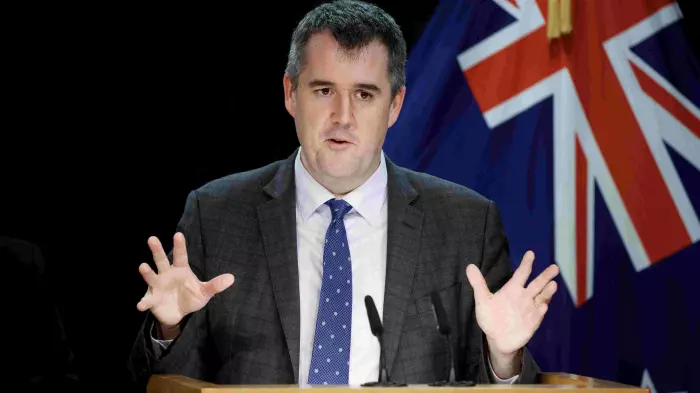As global trade becomes increasingly protectionist, New Zealand’s tech sector faces a welcome anomaly for now: digital exports are tariff-free.
Unlike goods, software and digital services still move relatively freely across borders, and nowhere is this opportunity greater than in India – a vast, fast-growing market hungry for innovation.
The story of Valocity Global, founded by Auckland-based serial entrepreneur Carmen Vicelich, is a masterclass in how Kiwi tech companies can thrive in India which with its 1.4 billion people, youthful demographics (over 50% under 28), and ambitious “housing for all” and financial inclusion policies, is digitising at speed.
Valocity Global now offers services to 20 banks in India, streamlining the process of valuing property with an app-based system that replaces manual and time-consuming valuation processes.
Beyond milk and apples
While NZ’s digital exports represent the country’s second-biggest export category according to the Technology Investment Network, Indian trade has historically focused on primary products.
Vicelich joined a trade delegation to India led by Prime Minister Christopher Luxon in March. As she told me on this week’s episode of The Business of Tech, “India doesn't need more milk or apples. They want to partner in technology, capability, and [intellectual property].”
Luxon famously undertook to deliver a free trade deal with India in his first term in government. The sticking point to reaching an agreement is agricultural products, particularly milk, with India’s dairy farmers fearing competition from larger-scale producers like Fonterra.
But IT and digital services represent a less contentious opportunity.
Air NZ signed a five-year IT services deal with Indian tech giant Tata Consultancy Services during the trade visit, which will see our national airline lean on Tata to advise it on cloud computing, artificial intelligence, data analytics and automation.
Spark followed up with a similar deal inked with Infosys, another giant name in Indian tech services. India may have a massive IT services sector, but it is also on the lookout for innovative tech-related services from NZ.
Key opportunities for tech in India
With millions entering the formal economy, banks require scalable tech solutions for credit, risk, and property valuation, making financial technology and digital banking key areas of growth.
India’s push for digitisation drives demand for advanced data tools across sectors, making companies specialise in data, AI, and analytics. Meanwhile, policy and climate realities make solutions for infrastructure, energy, and reporting highly valuable.
How Valocity cracked the Indian market
Valocity Global provides a prime example. Originally helping NZ and Australian banks digitise property valuation, Valocity confronted enormous challenges in India: a fragmented market, a lack of property data, highly manual processes, and different regulatory standards.
Their path to success required deep localisation. Vicelich said that Valocity abandoned the notion of “copy-paste” from NZ.
Instead, it built an India-specific app for valuers, with offline capabilities, geo-tagged photos, and digital templates tailored to each bank’s needs.
In India, it could take weeks to validate property value due to paper-based workflows. Valocity’s solution reduced this to hours with reliable data and audit trails.
Some banks weren’t ready for the cloud, so Valocity helped them develop cloud policies and ensured all data stayed within India, meeting legal requirements.
The company launched “Build IQ” to manage and digitise progress payments for properties under construction – a massive need in India’s housing boom.
Vicelich emphasised the importance of physically being in-market, appointing a local advisory board, and investing in long-term partnerships.
The result? Valocity has 20 banks onboard across India and has won awards as both Startup and Scaleup of the Year – an unlikely success for a foreign fintech in India.
Still, it’s a market not to be underestimated, Vicelich warned.
“If you’ve done it in India, nothing else will be as hard.”
Carmen’s five tips for Kiwi companies eyeing India
Go big, but be patient: “You're not going to be an overnight success. You have to get on the airplanes.” India rewards stamina and presence.
Local expertise matters: Appoint a local advisory board and hire on the ground. Accept that local knowledge will reveal what you don’t know.
Relationship building is everything: “You have to do a little bit of wooing and relationships.” Deals happen only after trust is established.
Solve for India, not just export: Tailor your solution to India’s needs – don’t assume what worked in NZ will work unmodified.
Leverage government channels: Trade missions and cross-government support amplify credibility and open doors.
Aim for excellence: Indian clients expect high compliance, quality, and innovation. The bar is high – but so are the rewards.
Listen to the entire discussion on episode 95 of The Business of Tech, streaming on iHeartRadio or wherever you get your podcasts.
Your weekly tech reading list:
- Ministry for Regulation turns its eye to telecommunications: BusinessDesk
- Bezos lost in PR space as Blue Origin’s all-female launch backfires: GeekWire
- Silicon Valley got Trump completely wrong: Vox
- NZTA’s outdated e-scooter regulations need a serious overhaul – editorial: NZ Herald
- Microsoft pulls out of two big data centre deals because it reportedly doesn't want to support more OpenAI training workloads: PC Gamer
- YouTube exemption exposes teen social media ban as a sham: Australian Financial Review
- AI tops startup funding deals in Australia, but there's a catch: Smart Company
- CBA customer wanted to buy $30k in bitcoin. The bank wouldn’t let him: Australian Financial Review
- A podcast star helped red-pill Silicon Valley – now he’s Trump’s tech tsar: Washington Post
- Spark follows Air NZ in deal with Indian outsourcer: NZ Herald














